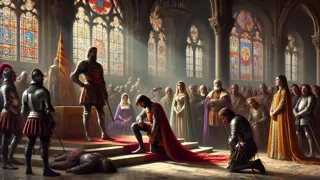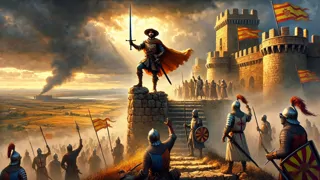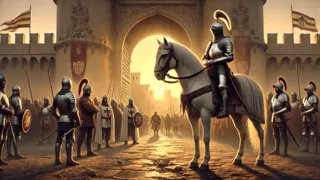Introduction
In the heart of medieval Spain, where sun-washed plains stretch toward distant sierras and ancient stone towers rise above golden fields, tales of valor and betrayal shape the fate of kingdoms. Among them stands one name whose legend outlives the clash of swords and the crumbling of castles: Rodrigo Díaz de Vivar—El Cid. His journey is carved in the memory of a nation, stitched into the tapestry of Castile and Aragon, sung by minstrels at fire-lit gatherings and whispered in the corridors of history. Exiled by a suspicious king, stripped of his lands and honor, Rodrigo begins his odyssey not as a conqueror but as an outcast. Yet exile cannot silence a heart forged in loyalty or a spirit kindled by unyielding courage. As the sun dawns over Vivar, Rodrigo mounts his faithful steed Babieca, leaving behind his beloved wife, Jimena, and daughters. He rides into uncertainty with a handful of devoted knights and the bitter taste of injustice in his mouth. Across harsh Meseta, through besieged cities and treacherous alliances, Rodrigo must win his place not only on the battlefield but in the hearts of friend and foe alike. Moorish emirs and Castilian nobles cross his path—some to challenge, others to aid. Each victory etches his name deeper into legend. But El Cid's journey is not only one of war and conquest; it is a quest for honor, redemption, and the return to those he loves. Through hardship, cunning, and unbreakable will, he rises from disgrace to become the champion of Spain—a hero for all ages, whose story still echoes from the stone halls of Burgos to the wild frontiers of Valencia.
Exile from Castile: Honor Cast Aside
Rodrigo Díaz de Vivar’s tale begins in the stone-walled city of Burgos, the heart of Castile. The morning he was cast into exile, silence weighed heavily in the air—broken only by the sound of hooves and the rustle of banners as he rode through the city’s narrow streets. Windows shuttered at his passing; fear and pity mingled in the glances of townsfolk who once cheered his name. King Alfonso VI, newly returned from exile himself, had accused Rodrigo of misappropriating tribute—an accusation rooted more in courtly envy than in truth. The verdict was swift and merciless: Rodrigo was to leave Castile within nine days, forbidden from seeking shelter or aid from his countrymen. Jimena, his steadfast wife, clung to him as the decree was pronounced. Their two daughters looked on, confusion and sorrow shadowing their young faces. Rodrigo pressed his family’s hands, promising to return with his honor restored. He gathered his loyal vassals—Álvar Fáñez, Martín Antolínez, Pero Bermúdez—and together they departed, riding into the uncertain dawn. Their only wealth: unwavering loyalty and the hope that destiny had not abandoned them.

The first days of exile tested them bitterly. The land was cold, and food was scarce. Many doors closed in fear of the king’s retribution, yet kindness flickered even in the harshest places. In a lonely village, a poor innkeeper offered them bread and wine in exchange for a tale of Rodrigo’s battles against the Moors. The Cid repaid him with a blessing and a promise to remember this kindness.
As they journeyed eastward, Rodrigo’s mind raced with plans. The king’s banishment was meant to break him, but defeat was not in his nature. He knew the borderlands between Christian and Moorish kingdoms were rife with unrest—and opportunity. There, a man with a sword and a name could still earn respect, even among strangers. Rodrigo sent word to distant allies, recalling debts owed from old campaigns. He forged new bonds with mercenaries and Moorish leaders wary of Castile’s growing power. Slowly, his company swelled—knights drawn by his reputation, foot soldiers lured by the promise of loot and fair command. Rodrigo’s army was not vast, but its heart beat fiercely.
Winter gave way to spring as they crossed into the lands of the Taifa of Zaragoza. Here, Moorish princes ruled in opulent cities beneath ornate arches and fragrant orange groves. Rodrigo, now called El Cid—the lord—was welcomed by Emir al-Muqtadir, who knew a valuable ally when he saw one. In return for military aid against rival taifas, El Cid’s men were housed and fed; gold and honor were paid in equal measure. Word of Rodrigo’s prowess spread swiftly. In the Battle of Almenar, his tactics routed a much larger force. In the siege of Alcocer, he outwitted both Christian and Moorish enemies, capturing the city and sharing its spoils with his men.
But exile wore on Rodrigo’s soul. At night, he wrote letters to Jimena, longing for news of home. He missed the laughter of his children, the warmth of his hearth, the certainty that he belonged. Yet every victory brought him closer to redemption. With each city won, each alliance forged, Rodrigo’s name grew. He was no longer merely a Castilian knight—he was El Cid, champion of all who lived by the sword and the code of honor.
Rise Among Moors and Christians: The Battle for Valencia
In exile, Rodrigo’s fortunes blossomed as his legend took root on both sides of the frontier. The lands between Christian Castile and the Moorish taifas of eastern Spain were a patchwork of allegiances and ancient rivalries. Rodrigo, both cunning and just, navigated these shifting sands with the skill of a seasoned strategist. His army, forged in hardship, moved like a shadow—striking swiftly, retreating with discipline, and earning both fear and admiration.

The city of Valencia stood as a prize coveted by Christian and Moor alike. Its rich fields and bustling port made it a jewel along the Mediterranean. Rumors reached El Cid that the city’s ruler, al-Qadir, was beset by enemies both within and without. Sensing opportunity, Rodrigo offered his protection. Under the banner of a mercenary lord, he entered Valencia not as a conqueror but as a savior. Yet intrigue simmered behind the city’s walls. Factions plotted, alliances shifted, and Rodrigo walked a razor’s edge between loyalty and necessity. He was respectful of the city’s customs, earning the trust of both Muslim and Christian citizens. Justice was meted impartially; order returned to streets once choked by fear.
But peace was fleeting. A coalition of Moorish emirs—resentful of Rodrigo’s growing power—massed armies to retake Valencia. The fields outside the city darkened with tents and banners from Granada, Seville, and Zaragoza. Inside the walls, the citizens braced for siege. Rodrigo moved among his troops, inspiring confidence with his calm authority. He placed trusted captains—Álvar Fáñez, Martín Antolínez—at key gates. Supplies were rationed; archers drilled atop the ramparts. The enemy’s first assault thundered against the walls but was hurled back by boiling oil and a rain of arrows. For weeks, Valencia stood as an island besieged.
In the dead of night, Rodrigo devised a plan. With moonlight veiled by storm clouds, he led a handpicked force through a hidden postern gate. They struck at the heart of the enemy camp, sowing chaos among sleeping soldiers. Fires erupted; tents collapsed in panic. The coalition fractured under the sudden onslaught, and their siege collapsed. With dawn, the fields outside Valencia were littered with abandoned banners and broken spears.
The city hailed Rodrigo as its liberator. He took his place as lord of Valencia, ruling with wisdom learned from both Christian and Moor. He restored churches and mosques alike, decreed fair taxes, and welcomed merchants from distant lands. His household swelled with exiled nobles, skilled artisans, and warriors eager to serve beneath his standard—a black banner emblazoned with a golden cross. Yet even in triumph, Rodrigo yearned for reconciliation with King Alfonso and the return of his family. He sent gifts and letters, recounting his victories and pledging loyalty. News of his deeds reached the king’s court in León, where rivals who once whispered against him now spoke in awe of his accomplishments. Alfonso’s pride warred with his need for a hero on the turbulent frontier. In time, he relented, allowing Jimena and their daughters to join Rodrigo in Valencia.
Their reunion was bittersweet—joy threaded through with scars of separation. Rodrigo welcomed them to a city transformed by his vision and courage. Together, they built a new home amid orange groves and marble courtyards. The songs sung in Valencia’s markets now carried his name from shore to mountain. El Cid was no longer merely a knight in exile; he was a ruler in his own right, a symbol of unity in a land torn by centuries of conflict.
Legacy Forged: Triumph, Betrayal, and the Final Stand
With Valencia firmly under his command, Rodrigo’s fame reached its zenith. Minstrels spun tales of El Cid’s valor in the courts of Europe; traders from Genoa and Pisa brought word of his deeds to distant shores. Yet even as the city flourished, danger brewed both outside its walls and within. The old rivalries between Christian and Moorish lords remained, and jealous hearts at Alfonso’s court never fully accepted Rodrigo’s independence.

Rodrigo sought to secure his legacy for his family. He arranged the marriages of his daughters, Cristina and María, to the Infantes de Carrión—noblemen from a prestigious but envious house. The union was meant to bind his lineage to Castile’s highest circles. At first, festivities filled the halls of Valencia: feasting, dancing, and laughter beneath tapestries woven with tales of conquest. But beneath the surface, malice simmered. The Infantes, cowed by Rodrigo’s reputation but hungry for his wealth, resented their new father-in-law’s shadow.
Trouble came swiftly. During a hunting expedition outside Valencia’s walls, the Infantes abandoned Rodrigo’s daughters in the forest, seeking to humiliate El Cid and avenge their wounded pride. Word reached Rodrigo through weeping servants and outraged knights. His anger was tempered by sorrow, but his sense of justice was unwavering. He summoned King Alfonso’s court to Burgos for a formal trial—a public reckoning.
In the great hall, Rodrigo presented his case. The Infantes squirmed beneath the weight of evidence and the scorn of assembled nobles. Alfonso listened with grave attention, keenly aware of Rodrigo’s value to the realm. When judgment was passed, the Infantes were stripped of honor and forced to return El Cid’s daughters along with compensation for their crime. Rodrigo’s family was restored not by the sword, but by the law—a testament to his wisdom as much as his might.
Yet fate offered little respite. Rumors swept through Spain that a vast Almoravid army—fierce warriors from North Africa—was crossing the sea to reclaim Valencia for Islam. Rodrigo readied his city for siege once more. The walls were reinforced, stores laid in, and every able-bodied citizen trained to defend hearth and home. The enemy came with banners black as midnight, drums echoing across the plains. The battle was fierce and unrelenting. Arrows blackened the sky; siege towers rumbled toward the gates. Rodrigo rode from bastion to bastion, rallying his men, offering words of courage and hope.
On the third day of battle, a fateful blow struck: Rodrigo was wounded by an enemy arrow. He was carried to his chambers, his body failing even as his spirit blazed. Sensing the end was near, he summoned Jimena and his closest captains. With quiet dignity, he entrusted Valencia to their care and asked only that his death not be revealed while the siege raged.
In a final act of cunning, Jimena and Rodrigo’s knights dressed his lifeless body in shining armor and mounted him atop Babieca. At dawn, they led him through the city gates as if he still lived. The sight of El Cid—his banner fluttering, his form unbowed—struck terror into the Almoravid ranks. They faltered, believing the invincible champion still led Valencia’s defense. Panic spread through their lines; the siege collapsed. Victory belonged to the Cid, even in death.
Valencia mourned its lord with tears and song. Rodrigo’s body was borne to the monastery of San Pedro de Cardeña near Burgos, where it rests to this day. His legend endured—in the hearts of his people, in the chronicles of kings, and in the timeless verses sung by minstrels. El Cid’s journey from exile to champion became a beacon for generations: proof that honor lost can be reclaimed, that courage in adversity can shape the fate of nations.
Conclusion
The story of Rodrigo Díaz de Vivar—El Cid Campeador—echoes far beyond his time. Through exile and triumph, betrayal and redemption, he became more than a warrior; he became the living spirit of Castile. His journey from disgraced knight to lord of Valencia shows that true greatness is measured not by birth or wealth, but by courage, loyalty, and a commitment to justice even in the face of despair. El Cid’s legacy endures in stone cathedrals and dusty roads, in the pages of Spain’s oldest epic poem, and in the hearts of all who value honor over power. His life reminds us that adversity can forge heroes and that the fight for dignity is timeless. Though centuries have passed, the tale of El Cid still rides across the plains of Spain—unbroken, undaunted, and immortal.


















